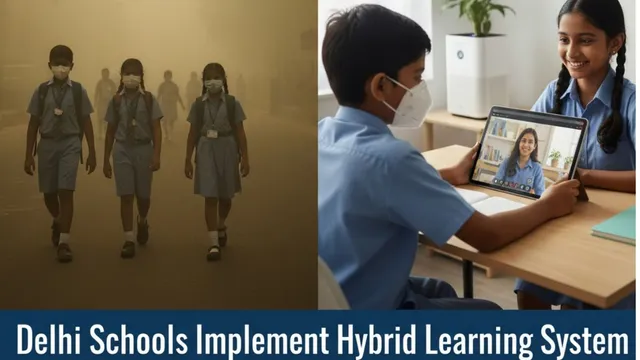- By Sarju Saran Tiwari
- Tue, 11 Nov 2025 02:01 PM (IST)
- Source:JND
Delhi Air Pollution: The Delhi government on Tuesday directed schools to conduct classes up to Class 5 in hybrid mode in view of the rising pollution levels in the city. the move comes after the Centre implemented anti-pollution measures under the third phase of the Graded Response Action Plan (GRAP).
The decision to impose GRAP stage 3 restrictions was taken after Delhi's average air quality index (AQI) rose sharply from 362 on Monday to 425 on Tuesday morning due to calm winds, stable atmosphere and unfavourable weather conditions, which allowed pollutants to accumulate close to the surface.
As per the order, All schools, including government, government-aided, and private schools, will have to conduct classes in a hybrid format for students up to grade 5.
Delhi Implements Phase III Measures Under GRAP Amid Severe Air Quality
The order issued by Director of Education Vedita Reddy, IAS, cited the deteriorating air quality in the National Capital Region (NCR) and the activation of Phase III (severe) measures under the Graded Response Action Plan (GRAP). Accordingly, in an effort to prevent further deterioration in air quality, the Sub-Committee on GRAP decides to implement with immediate effect all actions under Phase III (Delhi's 'severe' air quality as per the current schedule of GRAP), in addition to the already implemented Phase I and II actions, by all concerned agencies in Delhi-NCR.
Schools Directed to Continue Hybrid Mode Classes:
According to the Education Department circular (No. DE.23(28)/Sch.Br./2025/1004), all government, government-aided and unaided recognised private schools under the Education Department, NDMC, MCD and Delhi Cantonment Board have been directed to conduct classes in a hybrid format combining online and offline teaching till further orders.
What do the different phases of GRAP mean?
GRAP Phase 1 applies in 'poor' air quality conditions, when the AQI is between 201 and 300. Restrictions include a ban on work at unregistered construction sites, a ban on open burning, and restrictions on street sweeping and spraying. In Delhi-NCR, Phase 1 was implemented on October 14.
GRAP Phase 2, which first came into effect on October 19, focuses on discouraging the use of private vehicles and increasing cleanliness. Parking fees have been increased to discourage private transport – municipal authorities in New Delhi have already doubled the fees.
Polluting buses from neighboring states are prohibited from entering Delhi. Citizens are also advised to use public transport and carpool. The Delhi government has also changed office working hours to reduce traffic congestion.
In GRAP 3, restrictions will become even stricter.
All old four-wheel-drive vehicles (BS-III for petrol and BS-IV for diesel) will be strictly prohibited in Delhi-NCR. Diesel-powered medium goods vehicles (MGVs) registered in Delhi and some light commercial vehicles (LCVs) registered outside Delhi will also be prohibited, except for vehicles carrying essential goods. People will be advised to work from home if possible.
Also Read: National Education Day 2025: Why Do We Celebrate It On November 11? Know History And Importance
In GRAP stage 4, 'Severe Plus', in which the CAQM AQI limit is above 450, entry of trucks into Delhi is prohibited (except for trucks carrying essential goods and clean fuel).
The decision to implement hybrid learning system comes at a time when the national capital's AQI continues to remain in the 'severe' category (401-450), forcing authorities to take stringent measures to protect public health, especially that of young children.

